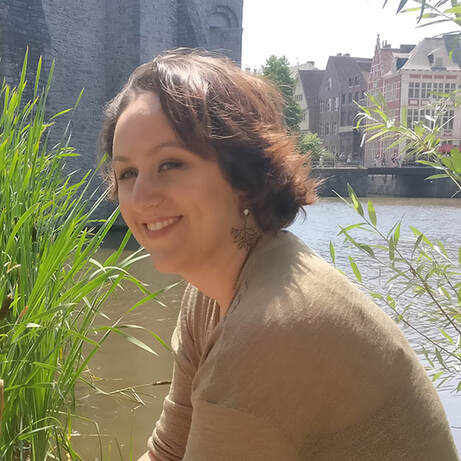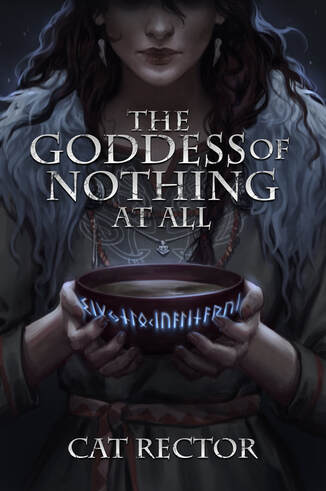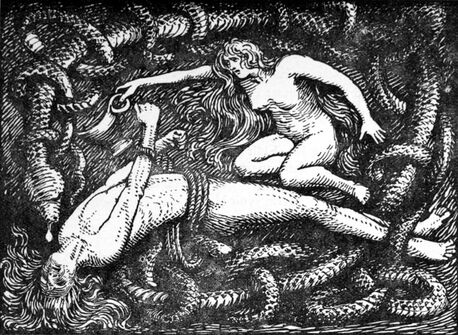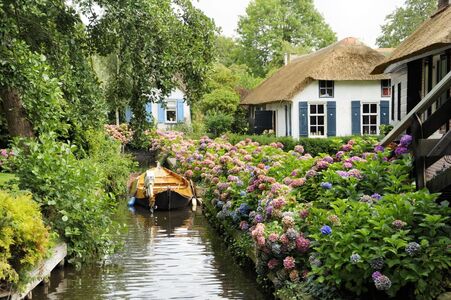|
Welcome Cat! Thanks for taking some time to chat about writing. First, a few quick-fire questions: What is your writing beverage of choice? Which of the nine worlds of Norse mythology would you most like to visit for a holiday? And if you could cast anyone as Sigyn in a movie adaptation of The Goddess of Nothing at All then who would it be? Thank you for having me! I’m so thrilled! Writing Beverage: A giant glass of ice water. I’m working on being a hydrated human. Nine Worlds Holiday: Alfheim. I don’t need to be in the middle of any Aesir/Vanir/Jotun wars, so Alfheim seems like the most chill place to not get murdered. I also imagine it to be quite pretty. Casting Sigyn: I think I’ll go with Zendaya with Mary Jane from Spider-man vibes. Nerdy, confident, self-sufficient. However, if I wanted to stick to the themes of the book, I’d hire an up-and-coming queer woman looking for a breakout role, because that’s the perfect description of Sigyn in the first place; someone who knows what they want but is still waiting for their big break. "Casting Sigyn: I think I’ll go with Zendaya with Mary Jane from Spider-man vibes. We have a unique connection, though we both live on opposite sides of the globe: we are both Canadians! How has being Canadian influenced your journey as a writer and why do you think so many Canadians (you and I as prime examples!) are drawn to Scandinavian mythology? Being Canadian often comes with certain privileges that other countries don’t have immediate access to. Despite growing up in less than ideal circumstances, I had access to education and free time and libraries, and all of that plays into becoming an author. On the other hand, however, I always felt a personal lack of culture and tradition growing up. Perhaps that’s simply an issue of the grass always being greener somewhere else, or because growing up in a small backwater town didn’t provide for a lot of cultural experiences. I was always looking for something to fill that void, and often found it through story. "On the other hand, however, I always felt a personal lack of culture and tradition growing up... As for why Canadians are drawn to Scandinavian mythology, I’ve personally found a sense of ‘home’ in the tone and setting. Scandinavian people worked hard on land and sea, suffered through harsh winters, and also had bears coming up on their back porch to see what’s for dinner. I’m half Newfoundlander, half Nova Scotian, and in my rural experience, we’re generally a humble, blue-collar people with a history of hard work and sailing and making the best of things. Even the landscape of Newfoundland is full of fjords and puffins. Greek, Roman, and Egyptian mythology take place in these bright, warm worlds that seem so foreign to me. But dark humour, harsh snowstorms, adversity? That was something I understood. "Greek, Roman, and Egyptian mythology take place in these bright, warm worlds that seem so foreign to me. But dark humour, harsh snowstorms, adversity? That was something I understood." The Goddess of Nothing at All explores the Norse cosmos through the eyes of Sigyn, known mostly as Loki’s faithful wife. I’ve recently enjoyed other ‘Alternative Perspective’ stories about the Norse myths, including Joanne Harris’ The Gospel of Loki, Geneveive Gornichec’s The Witch’s Heart, and Bjorn Larssen’s Children, so this seems very timely! What drew you to the character of Sigyn and what do you hope readers walk away with after reading this story? It would be romantic to say that I was initially drawn to Sigyn, but I wasn’t. How can you be drawn to someone whose One Job is to hold a bowl really good? But after Neil Gaiman’s rendition was released, I realized there were too many gaps in the story. So I read the Eddas, sure that I’d find answers there. Spoiler alert—I did not. The things that I wanted to know were just gone. Erased. So I started writing my own answers. I was drawn into the questions of cause and effect. Why doesn’t Odin make more logical choices? Why does Loki escalate from this troublemaker to a world-ender? What wouldn’t I do if people sewed my lips shut, tortured me, and took my children away? And finally, what kind of person stands by the man who ends the realms? Who is she? How strong must she have been to have endured all of the things that came before that cave? I had to know who she was. As far as what I’d like people to walk away with, the book is different things to different people. What I do hear over and over from women and non-binary readers is that they’ve lived part of Sigyn’s life. They know what it feels like to be overlooked and underestimated. They’re familiar with expecting nothing. And some of them have loved someone who is… self-destructive in nature. Mostly, I hope that people can have fun with the book, but I hope that it lets some readers feel seen. It was a work of catharsis for me, and maybe it can be that for someone else. The Norse myths are particularly notorious for being hard to adapt; with multiple, conflicting historical sources (few, if any, of which are complete), I’ve found that I do have to take some ‘artistic license’ at times. Were there any gaps in Sigyn’s story that you felt you had to fill in yourself? What was that process like and how did you make those decisions? *Unhinged laughter* Sigyn’s story is 97% gaps. It was both a wonderfully blank slate and a daunting challenge. To get started, I used her surroundings as a template. She has a reputation in some heathen circles as either the abused spouse or child bride, and I knew I didn’t want that. Loki is canonically cunning and handsome. It stands to reason he could find a wife he likes and respects without it having to be heinous, especially if we don’t relegate him to the role of Norse Lucifer. So what kind of woman would Loki respect? Probably someone smart, self-sufficient, bold, and driven. And if we look at so many godly duos across pantheons, we see things like Love marrying War, Earth and Sky, Yin and Yang. So if Loki is wild, unpredictable, and chaotic, Sigyn should be grounded, reliable, and loyal. "And if we look at so many godly duos across pantheons, we see things like Love marrying War, Earth and Sky, Yin and Yang. So if Loki is wild, unpredictable, and chaotic, Sigyn should be grounded, reliable, and loyal." After that, my priorities were to give her active roles in any myth she appeared in, to make sure she had agency even in places where the myths weren’t about her, and to ground every character’s choices in a logic and sense of morality that was true to their character. Those concepts guided all of my narrative choices as to what happened with each myth and how the book progresses from Sigyn meeting Loki in chapter two to the end of the realms. I often reflect on why we, in a modern day society, reach back to mythic narratives such as the Norse myths. What do you think the myths have to offer citizens of a digital, globally connected world which is steeped in science and rationalism? Myth is one of the doorways into something we used to have and no longer do. It speaks of a perceived “simpler time” with different expectations and a sense of magic still left in the world. If you visit the right places on the internet, there’s a resurgence of people yearning for this. Cottagecore, YouTube channels about moving to the woods, an explosion of the tiny house market. You can also see this in the popularization of spiritual practices like witchcraft, heathenry, paganism, etc. Of course, anyone who’s studied ancient Scandinavia, Rome, or Egypt knows that life wasn’t actually simple; imagine telling all of North America that they had to make their own bread every day! And as much as I believe in science and rationalism, they’ve pushed us further from a more natural life that values slowing down. They’ve stolen the idea of magic, something that humanity has always believed in. These myths let us peek back at the past, to witness magic, and believe in something immeasurable, whether that’s abstractly or in the form of a spiritual practice. One of the reasons I think that alternative viewpoint narratives have become so popular, at least here in Canada, is that we ourselves are re-examing and re-evaluating our own colonial history; the ‘good guys’ according to history textbooks don’t seem so good after a closer inspection. Are you hoping to stimulate social or political conversation about our own views of history or are you aiming to simply write a memorable story that engages readers? The examination of colonialism is long overdue. Very little of my book relates directly to that because the world doesn’t need another white Canadian opinion about what we did, but it’s also hard to write about queer Norse gods without reaching into the elimination of queer history. A lot of the world’s history has been examined by cisgender, white, straight, Christian men. Because of the rigidity of the last several hundred years in the west, we’ve seen archaeologists pick up an urn with two female lovers on it and declare them the very best roommates. (If you’re looking for a great beginner’s resource on this idea, the book Ancient Bodies, Ancient Lives: Sex, Gender, and Archaeology by Rosemary A. Joyce is a fantastic place to start.) And before archaeologists, armies were destroying cultures and stripping down religions, often putting an end to generations of happy queer existence. For example, before the land that became Canada was colonized, Indigenous peoples celebrated the Two-Spirit identity. Then Christianity arrived with its rigid ideas of marriage and a penchant for destruction. So we know that queer people have always existed, and were sometimes worshiped, so how did we get from worship to outlaw? "The examination of colonialism is long overdue. Very little of my book relates directly to that because the world doesn’t need another white Canadian opinion about what we did, but it’s also hard to write about queer Norse gods without reaching into the elimination of queer history." Like most things Viking, Christianity showed up and lots of knowledge was lost, so we don’t have a clear picture of queer life. It certainly wasn’t a utopia since (to oversimplify) it was considered an insult to be called “a bottom.” There are many things in the Eddas that could easily be read as queer and many people in the last years have taken up this angle of research. But there are also plenty of people who want to use Viking age culture at the forefront of their supremacist ideology. So when I began writing this book, it was very important to me that the cast of gods were primarily gods who have been overlooked or who were (canonically or not) outcasts, unknown, or marginalized. We may not ever perfectly know what a queer life from that time looked like, but in this respect and many others, I’d love for my readers to be questioning what we know, who told us, and how the past has been coloured by the victors. Can you give us a sneak peek at what your next project will be? Can we expect a sequel or are you exploring something new? I’ve got two projects lined up. First is Book 2, which is going to deal with the aftermath of The Goddess of Nothing at All and will be themed around grief and healing. After that, I’ll be jumping back into a queer witch story that’s highly inspired by puritan witch hunts, the agency of women, and indoctrination. Last, but not least, where can readers find your work and keep up to date on your latest publications? The Goddess of Nothing at All can be found via most major retailers, should be available to request at your local bookstore, and you can even ask your library to order a copy! Try this link to find out where it’s available in your region. The best places to keep up with me are on Twitter, Instagram, or Tiktok, and if you’re a real go-getter, you can sign up for my newsletter via my website! If you preorder, don’t forget to grab your preorder perks here! Sign up for Cat's newsletter via her website to keep up to date on all her latest projects!
0 Comments
|
AuthorJoshua Gillingham is an author, editor, and game designer from Vancouver Island, Canada. Archives
April 2022
Categories
All
|





 RSS Feed
RSS Feed
